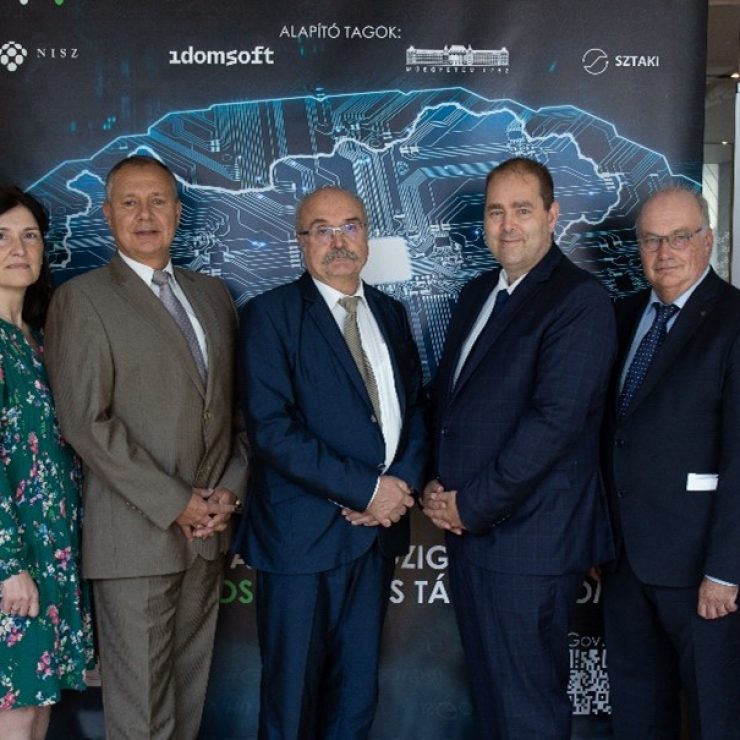What [YOU NEED] to know about us
Establishment of the Secure Digital Society Innovation Cluster
The direct goals of creating the Secure Digital Society Innovation Cluster are to coordinate research activities aimed to progress in research areas for a secure society and a secure environment (to achieve the objectives of the home affairs sector related to digital technologies, automation and artificial intelligence applications) as well as to integrate and coordinate their cooperation in order to make them more efficient and effective.
In the course of cooperation, the public IT service providers and the leading higher education and scientific institutions in professional research will be given an important role. The Cluster is an appropriate cooperation interface and an integrative form of organization; at the same time, it is sufficiently open to bring together a wide range of professional research and development processes that strengthen the meeting of the needs of society and guarantee the implementation of innovations that support the development and increase the efficiency of e-government as early as in the medium term by achieving the results set out in its objectives.
The strategic goal of the Cluster is to promote the application of artificial intelligence for public administration development purposes, which is reflected in the complex activities carried out by the members of the Cluster in the framework of research, development and innovation. The main focus points of the activities of the Cluster is to research the application possibilities of artificial intelligence and to disseminate the results as widely as possible among public administration and law enforcement bodies as well as to support the capabilities related to the protection of National Data Assets.
The Cluster plans to use the results of its research and development primarily in connection with the performance of public tasks; however, some of its results may also be utilized by the Hungarian State in accordance with its interests and for its benefit, in the international arena or in the market environment.
The BDTI Cluster operates as part of the National Laboratory of Infocommunications and Information Technology (InfoLab). The project implemented in the InfoLab Consortium is led by the National Security Service. Its consortium partner is IdomSoft Zrt., which also provides the management of the BDTI Cluster. The founding members of the Cluster are IdomSoft Informatikai Zrt., Nemzeti Infokommunikációs Szolgáltató Zrt., the ELKH Computer Science and Automation Research Institute, and the BME Budapest University of Technology and Economics. Home affairs bodies are committed to supporting the Cluster in order to facilitate targeted AI research in Hungary, to coordinate resources and to properly utilize the results. The membership of the Cluster is constantly expanding with the central state administration bodies overseen by the Minister of the Interior, Hungarian higher education institutions, research institutions and businesses.

CLUSTER VIDEO

Founding
Member
National
Lab
Virtualized
Development Environment
Developing
International Partnership




Get to [KNOW] our members

IdomSoft
The name of IdomSoft may sound less familiar than those of many other large IT companies, although we can say without immodesty: every Hungarian citizen has already encountered our developments. Anyone who has been abroad, has a customer portal, has a driving licence, has a car, has already voted, has an ID card, lives somewhere or was born at all, has got in touch with us without maybe knowing about it.
Read more
We work to make it as simple and fast as possible for people to get their business done. We have been given the task by our shareholder, the Hungarian State, to create the basic conditions for the smooth operation of public administration in Hungary, to provide the appropriate IT background for this, to develop, integrate, operate the system or to train people if necessary. IdomSoft has set itself the goal of serving the community. Below, we highlight some important results of our work, which are also tangible to the general public, without claiming completeness.

BME - IK
The Council of the Budapest University of Technology and Economics (BME) established the BME IT Centre (BME IK) in 1998. The name of the Centre was changed to Public Administration IT Centre in 2009, maintaining its full profile.
Read more
The aim and task of BME IK are to initiate, organize and coordinate the cooperation of research groups and development institutions within and outside the University in externally funded (domestic and international applications, market assignments) research and development projects. The Centre promotes and coordinates the utilization of its own knowledge base and those of other organizational units of BME, cooperation with market participants in the information economy, and the knowledge transfer of its own and other universities’ creative groups. BME IK makes a special effort to be able to take part in carrying out domestic IT development tasks, which require a high degree of knowledge concentration, and to improve the global competitiveness of Hungarian small and medium-sized enterprises through technology transfer.
BME IK works with a number of multinational and domestic companies and research institutes in domestic and international developments and research. It participates in the performance of the IT tasks of governmental and national public administration organizations, and has formed a partnership with a social and advocacy organization for carrying out the development tasks of information society.
The Public Administration IT Centre is the first university organizational unit to hold the official certificate of both the MSZ EN ISO 9001:2015 quality management system and the MSZ EN ISO/IEC 27001:2013 information protection management system. In accordance with the statutes of BME IK, it mobilizes its own resources in its research and development cooperation and in specific product and service development work, but at the same time its dynamic human resources management enables it to use the intellectual background of the University. Over the past more than 20 years, its appropriate forms and partners within the university have emerged.

NISZ
NISZ Zrt. is the leading infocommunication service provider in the Hungarian public administration sector, which, with more than 1,600 employees and three subsidiaries, provides professional infocommunication services to nearly 300 institutions nationwide.
Read more
From basic voice and data services to the establishment of complex virtual private networks to the development of cloud-based solutions and applications, the company combines the latest technologies with the knowledge of its experts and operates the most secure, critical IT infrastructure of the Hungarian state. Its largest customers are public administration bodies and institutions with nationwide competence, but business organizations, businesses and individuals also use some of its services.
Relying on a decade of experience gained in the operation of government telecommunications and information technology services, the main goal of NISZ Zrt. is to facilitate users’ access to modern e-administration solutions. Due to its developments, citizens and businesses have been able to handle the vast majority of their administrative matters online since 2018. The central e-administration portal operated by the company allows users to submit, among other things, their tax returns and passport and ID card applications electronically and to contact public administration bodies quickly and securely from anywhere.
As a Hungarian company of strategic importance, NISZ Zrt., in addition to continuously raising the standard of government infocommunication services, also plays a significant role in the implementation of a wide range of national IT and e-government development projects financed by the European Union and the Hungarian government. It is headquartered in Budapest.

SZTAKI
The Computer Science and Automation Research Institute (SZTAKI) is a member of the Eötvös Loránd Research Network (ELKH) and is the largest and most successful IT research institute in the country. SZTAKI is the workshop of the science of informatics in the broad sense, the national research base of information technology, computer science and related fields. It deals primarily with technical and scientific and mathematical issues in IT, but the research covers all areas related to basic issues.
Read more
In addition to extensively performing basic and applied research, it is an important task to utilize the acquired special knowledge in the field of research and development, system planning and system integration, consulting and software development..
Our basic principle is creating basic research measured by international standards; creating the succession of IT developments and high-level consulting activities, which can be utilized in Hungary and abroad; implementing a centre of excellence in the broader subject, which provides attractive topics and conditions for talented young people’s PhD studies and starting their activities.
The activity philosophy of the Institute is based on the fact that the basic research departments specializing in basic research and performing it to a high standard ensure:
- the domestic and international ‘goodwill’ of the Institute in certain priority areas as well as usable results and a problem-solving environment, which give the Institute a competitive advantage over companies specializing in certain products and application areas as well as the involvement of talented young people in research and application tasks in the areas of system planning and consulting, through university education;
- by contrast, the profits of application and entrepreneurial activities serve as a basis for the procurement of the infrastructure required for research and consultancy, and provide additional income for researchers (too) in addition to the budgetary subsidy provided for basic research.
Areas of research
The subjects studied by the Institute can be grouped according to the following partially interrelated areas:
Basic (exploratory) research directions
- Computer science and technology
- System and control theory
- Machine perception and interaction
- Engineering and business intelligence
Applied research directions
- Automotive industry and transport
- Production IT and logistics
- Energy and sustainable development
- Security and surveillance
- Networks, network systems and services, distributed computing
Our goal is to integrate the results achieved in the fields of engineering, mathematics and computer science in problem solving and system development. The traditionally open intellectual environment of the Institute can maintain the internal bridge that has been created from basic theoretical research to prototype developments, applications and to system integrations.
Know more about the [Infocommunication] and Technology National Lab
The main research directions indicated in the project are result-oriented and are aimed at performing an administrative, national security and law enforcement task.
The aim of the cooperation is to encourage scientific and educational institutions to create scientifically well-founded development results, which can also be utilized in the digitization of public administration, data-driven public governance, national security and law enforcement in the preferred subject areas.
In the InfoLab Project, the collaborating bodies wish to achieve their research goals in two well-separated bunches of sub-projects.
The research and development target areas are research areas for national security and cyber security, and the results of R&D support law enforcement, policing and e-government tasks:


5G research

Artificial intelligence application and machine text analysis

Development of cyber defence capabilities

Internet protocols and encryption

Development of an intermediate layer of specialized administrative systems

Administrative procedures

Protection of national data assets

5G research
New and upgraded known threats appearing as a result of the paradigm shift generated by the 5G technology pose a serious challenge to the bodies responsible for regulation, national defence and law enforcement. The research aims to ensure that the National Security Service keeps pace with technical development and the technological paradigm shift, which can provide an appropriate response to the (cyber) security risks caused by technological development.
Development of cyber defence capabilities
The project aims to carry out the research necessary for the development of the cyber defence capabilities of the National Security Service, which are aimed at surveying devices connected to the internet in Hungary, identifying hacked websites/devices, creating a domestic cyber security R&D&I cluster, following security awareness in Hungary, the security issues of IoT devices and implementing real-time vulnerability information management. The aim of developing cyber capabilities is to reduce Hungary’s cyber exposure.
Internet protocols and encryption
In the course of the research, the necessary knowledge related to quantum computing / technology is collected and competencies are transferred. The primary goal is to become familiar with the research results and application possibilities of new cryptographic directions and methods. Research into the latest algorithms forms an integral part of international cryptographic research, so knowledge of these can also help understand encryption procedures.
Development of an intermediate layer of specialized administrative systems
In the course of the sub-project, the possibilities provided by the statutory framework determining the different legal bases of data processing according to tasks/competencies and related to individual powers as well as the technological conditions of m-governance specified in the Public Administration Development Strategy and the development of an environment facilitating its introduction must be examined.
Administrative procedures
Based on the considerations specified in the Public Administration Development Strategy and the Hungarian and Digital Welfare Programmes, feasible technological and service development opportunities as well as the possibilities of increasing the efficiency of the procedures of authorities (AI / other automated systems running on mobile applications) and extending such procedures must be examined.
CONTACT [us] !
contact: email: info@isGov.hu













